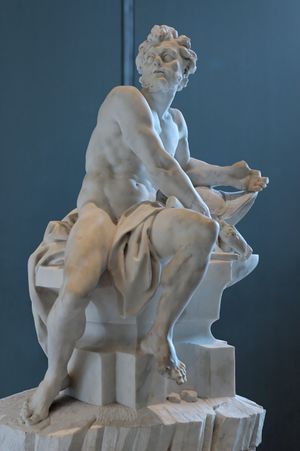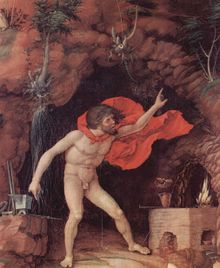هفستوس
| Hephaestus | |
|---|---|
God of fire, metalworking, stone masonry, forges, the art of sculpture, technology and blacksmiths | |
| عضو في the Twelve Olympians | |
 Hephaestus at the Forge by Guillaume Coustou the Younger (Louvre) | |
| المسكن | Mount Olympus |
| الرمز | hammer, anvil, tongs |
| معلومات شخصية | |
| الأبوان | Zeus and Hera, or Hera alone |
| الأشقاء | Aeacus, Angelos, Aphrodite, Apollo, Ares, Artemis, Athena, Dionysus, Eileithyia, Enyo, Eris, Ersa, Hebe, Helen of Troy, Heracles, Hermes, Minos, Pandia, Persephone, Perseus, Rhadamanthus, the Graces, the Horae, the Litae, the Muses, the Moirai |
| القرين | Aphrodite, Aglaea |
| الأنجال | Thalia, Erichthonius, Eucleia, Eupheme, Philophrosyne, Cabeiri and Euthenia |
| الآلهة المكافئة | |
| المكافئ الروماني | Vulcan |
| المكافئ الكنعاني | Kothar-wa-Khasis[1] |
| المكافئ Egyptian | Ptah |
| جزء من سلسلة عن |
| الديانة اليونانية القديمة |
|---|
 |
|
|
هفستوس ( Hephaestus ؛ /hɪˈfiːstəs, hɪˈfɛstəs/; eight spellings; باليونانية: Ἥφαιστος Hḗphaistos) هو الإله اليوناني المناظر للإله الروماني ڤولكان؛ وهو إله التكنولوجيا والحدادة والمهارة والفنانين والمثالين والمعادن والنار. وقد عـُبد في كل المراكز الصناعية في اليونان، وخصوصاً أثينا. وقد ربطه المستوطنون اليونان في جنوب إيطاليا بآلهة البراكين أدرانوس من جبل إتنا وڤولكانوس من جزر ليپارا، وورشة حدادته جعلها الشعراء في جنوب إيطاليا. وابن لزيوس كبير الالهه وابن لهيرا و أخو هيستيا ربة الصبي والشباب والجمال والاله أريس رب الحرب . وهو رب الحدادة والنار والصناعة هو من شج راس ابيه زيوس لتخرج منها أثينا وزوج للربه أفروديت.
أصل الاسم
Hephaestus is probably associated with the Linear B (Mycenaean Greek) inscription 𐀀𐀞𐀂𐀴𐀍, A-pa-i-ti-jo, found at Knossos.[2] The inscription indirectly attests his worship at that time because it is believed that it reads the theophoric name (H)āpʰaistios,[2] or Hāphaistion.[3][4] The Greek theonym Hēphaistos is most likely of Pre-Greek origin, as the form without -i- (Attic Hēphastos) shows a typical Pre-Greek variation and points to an original sy.[2]
الأساطير
مهارة هفستوس

Genealogy
| Hephaestus's family tree [5] | |||||||||||||||||||||||||||||||||||||||||||||||||||||||||||||||||||||||||||||||||||||||||||||||||||||||||||||||||||||||||||||||||||||||||||||||||||||||||||||||||||||||||||||||||||||||||||||||||||||||||||||||||||||||||||||||||||||||||||||||||||||||||||||||||||||||||||||||||||||||||||||||||||||||||||||||||||||||||||||||||||||||||||||||||||||||||||||||||||||||||||||||||||||||||||||||||||||||||||||||||||||||||||||||||||||||||||||||||||||||||||||||||||||||||||||||||||||||||||||||||||||||||||||||||||||||||||||||||||||||||||||||||||||||||||||||||||||||||||||||||||||||||||||||||||||||||||||||||||||||||||||||||||||||||||||||||||||||||||||||||||||||||||||||||||||||||||||||||||||||||||||||||||||||||||||||||||||||||||||||||||||||||||||||||||||||||||||||||||||||||||||||||||||||||||||||||||||||||||||||||||||||||||||||||||||||||||||||||||||||||||||||||||||||||||||||||||||||||||||||||||||||||||||||||||||||||||||||||||||||||||||||||||||||||||
|---|---|---|---|---|---|---|---|---|---|---|---|---|---|---|---|---|---|---|---|---|---|---|---|---|---|---|---|---|---|---|---|---|---|---|---|---|---|---|---|---|---|---|---|---|---|---|---|---|---|---|---|---|---|---|---|---|---|---|---|---|---|---|---|---|---|---|---|---|---|---|---|---|---|---|---|---|---|---|---|---|---|---|---|---|---|---|---|---|---|---|---|---|---|---|---|---|---|---|---|---|---|---|---|---|---|---|---|---|---|---|---|---|---|---|---|---|---|---|---|---|---|---|---|---|---|---|---|---|---|---|---|---|---|---|---|---|---|---|---|---|---|---|---|---|---|---|---|---|---|---|---|---|---|---|---|---|---|---|---|---|---|---|---|---|---|---|---|---|---|---|---|---|---|---|---|---|---|---|---|---|---|---|---|---|---|---|---|---|---|---|---|---|---|---|---|---|---|---|---|---|---|---|---|---|---|---|---|---|---|---|---|---|---|---|---|---|---|---|---|---|---|---|---|---|---|---|---|---|---|---|---|---|---|---|---|---|---|---|---|---|---|---|---|---|---|---|---|---|---|---|---|---|---|---|---|---|---|---|---|---|---|---|---|---|---|---|---|---|---|---|---|---|---|---|---|---|---|---|---|---|---|---|---|---|---|---|---|---|---|---|---|---|---|---|---|---|---|---|---|---|---|---|---|---|---|---|---|---|---|---|---|---|---|---|---|---|---|---|---|---|---|---|---|---|---|---|---|---|---|---|---|---|---|---|---|---|---|---|---|---|---|---|---|---|---|---|---|---|---|---|---|---|---|---|---|---|---|---|---|---|---|---|---|---|---|---|---|---|---|---|---|---|---|---|---|---|---|---|---|---|---|---|---|---|---|---|---|---|---|---|---|---|---|---|---|---|---|---|---|---|---|---|---|---|---|---|---|---|---|---|---|---|---|---|---|---|---|---|---|---|---|---|---|---|---|---|---|---|---|---|---|---|---|---|---|---|---|---|---|---|---|---|---|---|---|---|---|---|---|---|---|---|---|---|---|---|---|---|---|---|---|---|---|---|---|---|---|---|---|---|---|---|---|---|---|---|---|---|---|---|---|---|---|---|---|---|---|---|---|---|---|---|---|---|---|---|---|---|---|---|---|---|---|---|---|---|---|---|---|---|---|---|---|---|---|---|---|---|---|---|---|---|---|---|---|---|---|---|---|---|---|---|---|---|---|---|---|---|---|---|---|---|---|---|---|---|---|---|---|---|---|---|---|---|---|---|---|---|---|---|---|---|---|---|---|---|---|---|---|---|---|---|---|---|---|---|---|---|---|---|---|---|---|---|---|---|---|---|---|---|---|---|---|---|---|---|---|---|---|---|---|---|---|---|---|---|---|---|---|---|---|---|---|---|---|---|---|---|---|---|---|---|---|---|---|---|---|---|---|---|---|---|---|---|---|---|---|---|---|---|---|---|---|---|---|---|---|---|---|---|---|---|---|---|---|---|---|---|---|---|---|---|---|---|---|---|---|---|---|---|---|---|---|---|---|---|---|---|---|---|---|---|---|---|---|---|---|---|---|---|---|---|---|---|---|---|---|---|---|---|---|---|---|---|---|---|---|---|---|---|---|---|---|---|---|---|---|---|---|---|---|---|---|---|---|---|---|---|---|---|---|---|---|---|---|---|---|---|---|---|---|---|---|---|---|---|---|---|---|---|---|---|---|---|---|---|---|---|---|---|---|---|---|---|---|---|---|---|---|---|---|---|---|---|---|---|---|---|---|---|---|---|---|---|---|---|---|---|---|---|---|---|---|---|---|---|---|---|---|---|---|---|---|---|---|---|---|---|---|---|---|---|---|---|---|---|---|---|---|---|---|---|---|---|---|---|---|---|---|---|---|---|---|---|---|---|---|---|---|---|---|---|---|---|---|---|---|---|---|---|---|---|---|---|---|---|---|---|---|---|---|---|---|---|---|---|---|---|---|---|---|---|---|---|---|---|---|---|---|---|---|---|---|---|---|---|---|---|---|---|---|---|---|---|---|---|---|---|---|---|---|---|---|---|---|---|---|---|---|---|---|---|---|---|---|---|---|---|---|---|---|---|---|---|---|---|---|---|---|---|---|---|---|---|---|---|---|---|---|
| |||||||||||||||||||||||||||||||||||||||||||||||||||||||||||||||||||||||||||||||||||||||||||||||||||||||||||||||||||||||||||||||||||||||||||||||||||||||||||||||||||||||||||||||||||||||||||||||||||||||||||||||||||||||||||||||||||||||||||||||||||||||||||||||||||||||||||||||||||||||||||||||||||||||||||||||||||||||||||||||||||||||||||||||||||||||||||||||||||||||||||||||||||||||||||||||||||||||||||||||||||||||||||||||||||||||||||||||||||||||||||||||||||||||||||||||||||||||||||||||||||||||||||||||||||||||||||||||||||||||||||||||||||||||||||||||||||||||||||||||||||||||||||||||||||||||||||||||||||||||||||||||||||||||||||||||||||||||||||||||||||||||||||||||||||||||||||||||||||||||||||||||||||||||||||||||||||||||||||||||||||||||||||||||||||||||||||||||||||||||||||||||||||||||||||||||||||||||||||||||||||||||||||||||||||||||||||||||||||||||||||||||||||||||||||||||||||||||||||||||||||||||||||||||||||||||||||||||||||||||||||||||||||||||||||
انظر أيضاً
هامش
- ^ "Kothar". Britannica.
- ^ أ ب ت Beekes 2009, p. 527.
- ^ Chadwick, John (1976). The Mycenaean World. Cambridge, UK: Cambridge University Press. pp. 99. ISBN 0-521-29037-6. At Google Books.
- ^ Anthology of Classical Myth: Primary Sources in translation. Hackett Publishing. 2004. p. 443. ISBN 0-87220-721-8. At Google Books
- ^ This chart is based upon Hesiod's Theogony, unless otherwise noted.
- ^ According to Homer, Iliad 1.570–579, 14.338, Odyssey 8.312, Hephaestus was apparently the son of Hera and Zeus, see Gantz, p. 74.
- ^ According to Hesiod, Theogony 927–929, Hephaestus was produced by Hera alone, with no father, see Gantz, p. 74.
- ^ According to Hesiod, Theogony 886–890, of Zeus' children by his seven wives, Athena was the first to be conceived, but the last to be born; Zeus impregnated Metis then swallowed her, later Zeus himself gave birth to Athena "from his head", see Gantz, pp. 51–52, 83–84.
- ^ According to Hesiod, Theogony 183–200, Aphrodite was born from Uranus' severed genitals, see Gantz, pp. 99–100.
- ^ According to Homer, Aphrodite was the daughter of Zeus (Iliad 3.374, 20.105; Odyssey 8.308, 320) and Dione (Iliad 5.370–71), see Gantz, pp. 99–100.
وصلات خارجية
- Theoi Project, Hephaestus in classical literature and art
- Greek Mythology Link, Hephaestus summary of the myths of Hephaestus
| سلسلة الآلهة اليونانية |
|---|
| Primordial deities | العمالقة | الآلهة المائية | Chthonic deities |
| الاولمپيون الاثنى عشر |
| زيوس | هيرا | پوسايدون | هستيا | دميتر | أفروديت أثينا | أپولو | أرتميس | أرس | هفستوس | هرمس |
- Short description with empty Wikidata description
- Pages using sidebar with the child parameter
- Portal-inline template with redlinked portals
- Pages with empty portal template
- Articles containing Ancient Greek (to 1453)-language text
- Articles containing Mycenaean Greek-language text
- أساطير يونانية
- آلهة النار
- آلهة يونانية
- الاوليمبيون الاثنى عشر
- آلهة الحدادة
- أبناء زيوس
- Hephaestus
- Fire gods
- Smithing gods
- Volcano gods
- Mythological rapists
- Children of Hera
- Consorts of Aphrodite
- Deities in the Iliad
- Deeds of Athena
- Crafts gods
- Deeds of Poseidon
- Children of Zeus
- Characters in the Odyssey
- Metamorphoses characters
- Metalsmiths
- Consorts of Gaia
- Helios in mythology
- Deeds of Aphrodite
- Twelve Olympians


